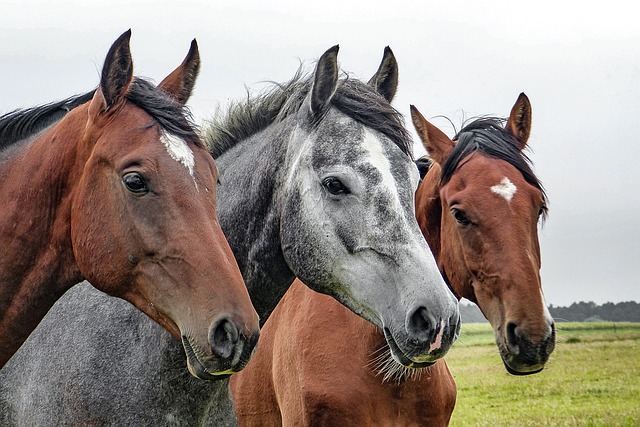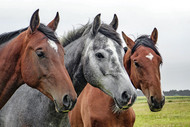How Long Do Horses Live?
Sep 4th 2020
 The short answer is that many horses will live well past the age of 30. Compared to domestic cats and dogs, that's practically an eternity. Beyond just living to 30 years, however, many senior horses are still quite active, being ridden and used for other light driving.
The short answer is that many horses will live well past the age of 30. Compared to domestic cats and dogs, that's practically an eternity. Beyond just living to 30 years, however, many senior horses are still quite active, being ridden and used for other light driving.
Horse Longevity Varies By Breed
Just as breakthroughs in nutrition and medicine have increased average the lifespan in humans, it has done the same for our equine friends. Horses and ponies alike are living longer lives; though, some breeds simply have a greater longevity.
All factored together, 25-to-33 years is the average lifespan among domestic horses. Because this is the average, some horses will live well past this average. As a rule, ponies tend to live the longest, with many serving as schoolmasters even after they have aged into their 30s. Some ponies and horses can even live past the age of 40. As far as we know, the oldest horse age on record is a whopping 52 years old. That said, draft breeds and other larger horses tend to have shorter life spans than smaller breeds like Arabians. Of course, there are exceptions.
It's Not Always Easy to Determine a Horse's Age
It can actually be very difficult to discern the age of very old horses. This is because horses of a certain age have usually been under the care of several different owners and just don't have the proper identifying paperwork any more. You can get close to determining age by examining a horse's teeth, but this is far from an exact science for pinning down an age. If the horse has registration papers or a competition passport, you could be in luck. Often, though, this is just not the case.
Proper Care for Aging Horses
You don't have to look far to find reports of senior horses living long and healthy lives when they have the proper care. Of course, proper care starts with standard maintenance, which includes:
- dental care
- hoof care
- proper feeding
With that care, some horses can continue to be treasured pets for years after they are retired.
By the numbers, about 50% of domestic horses will die of old age. Along the way, certain health issues may put owners in the unenviable position of having to put a horse down before it lives out its normal projected lifespan. It's worth nothing that euthanasia, while an extremely difficult and often painful decision, is more responsible than letting a horse live with a painful and/or debilitating condition.
In nature, horses that become ill or just slow down with age often fall prey to starvation, colic, or well... actual predators. As horses age, their immune systems weaken, making them more susceptible to illness. When that happens, the progression of the illness often happens quickly. Domestic horses, however, with access to veterinary care and human assistance live longer, healthier lives than horses did in even recent decades.
Is Your Horse Approaching Its Senior Years?
As we mentioned, smaller breeds tend to outlive larger breeds. That's because smaller breeds, in general, age more slowly than their larger breed brethren. Of course, nature and nurture both play roles. In short, though, once horses age past 15 years, they are generally considered "older" horses. At 15+ years old, your horse might appear healthy and spry, but there are always internal aging processes at work that we can't see from the outside, so paying close attention to your horse's habits and behaviors is key to keeping it healthy in its later years.
How to Tell if your Horse is Reaching Its Senior Years
Like humans and dogs, older horses will "gray," meaning they will start to grow gray hair around their muzzle and eyes. Of course, this will be easier to notice on darker-colored horses. Bays, chestnuts, and other horses that become grey horses over time can become even whiter and speckled as they get older. After the age of 15, it is not uncommon for a grey horse to be white!
Other changes to aging horses includes skin that feels dryer and thicker, with a coat that starts to lose its sheen.
Another sign—one which you can certainly help with—is changes in gait. As horses age, they can lose muscle mass and be more prone to arthritis. A balanced diet that incorporates supplements as necessary, can make a world of difference; so can regular exercise.
You might see a decrease in appetite as your horse ages, which is why it is especially important to keep a close eye on diet and ensure that the feed is nutrient-dense enough to compensate for smaller appetites.
Another common attribute in senior horses is longer healing times for normal cuts and scrapes. Again... diet is key here.
It's common knowledge that a horse's teeth will give clues to its age, but do you know what to look for in a horse's mouth? Older horses often have longer teeth in the front, but worn and/or missing teeth in the back. At 15+, the groove on the outside of its teeth will be grown almost completely out. Further, sloped, stained, and yellowed teeth is also a sign of older horses. Some elder horse will simply have gaps where teeth used to be!
Lordosis, commonly known as "sway back" is common in older horses. This occurs when the muscles in the back go slack. On occasion, you will see this condition in younger horses; that, though, is not a sign of aging.
Muscles can go slack in places beyond just the back. Another common location is around the eyes. If you see horses with "hollow-looking" eyes, this is usually the culprit.
Finally, horses will just become more tired as they age—much like humans. As such, you should be more patient with warm ups and lighten up on the intensity of the workout. Pay special care to the joints, as well. At the risk of being redundant, a healthy diet is an ideal way to not only help your horse maintain energy levels, but also reduce recovery times.
In Conclusion
Even if your horse falls squarely in the senior category, that's not a good reason for it to be "put out to pasture." With the right care, some horses continue to work and even compete well into their later years. Remember, 15 is an unofficial age for determining senior horses. Just like people, horses age at different rates, which is often related to environment, diet, levels of exercise, access to medicine, and so on.

